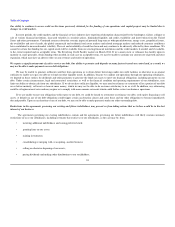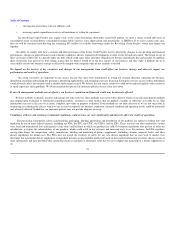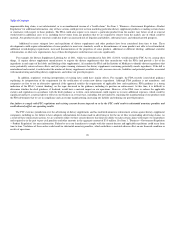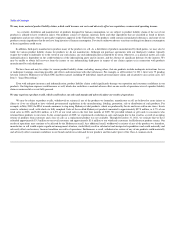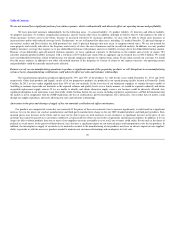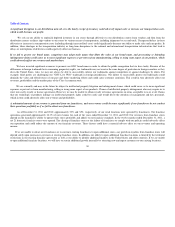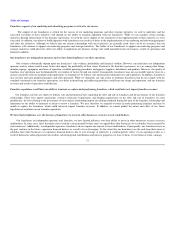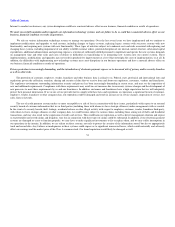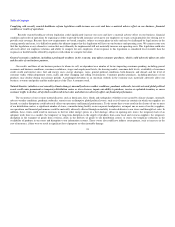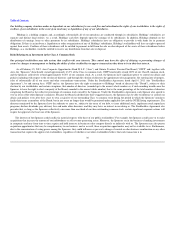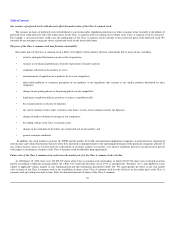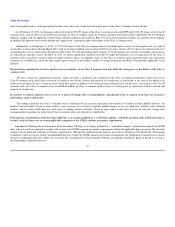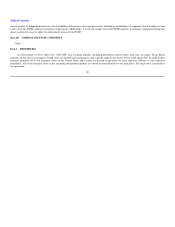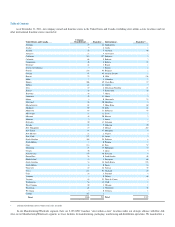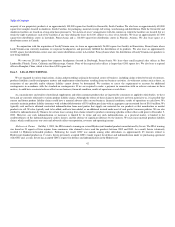GNC 2012 Annual Report Download - page 35
Download and view the complete annual report
Please find page 35 of the 2012 GNC annual report below. You can navigate through the pages in the report by either clicking on the pages listed below, or by using the keyword search tool below to find specific information within the annual report.
Table of Contents
inconsistent product regulation or sudden policy changes by foreign agencies or governments;
the imposition of, or increase in, duties, taxes, government royalties or non-tariff trade barriers;
difficulty in collecting international accounts receivable and potentially longer payment cycles;
difficulty of enforcing contractual obligations of foreign franchisees;
increased costs in maintaining international franchise and marketing efforts;
problems entering international markets with different cultural bases and consumer preferences;
compliance with laws and regulations applicable to international operations, such as the Foreign Corrupt Practices Act and regulations
promulgated by the Office of Foreign Asset Control;
fluctuations in foreign currency exchange rates; and
operating in new, developing or other markets in which there are significant uncertainties regarding the interpretation, application and
enforceability of laws and regulations relating to contract and intellectual property rights.
Any of these risks could have a material adverse effect on our international operations and our growth strategy.
We may be unable to successfully expand our operations into new international markets.
If the opportunity arises, we may expand our operations into new and high-growth international markets. However, there is no assurance that we will
expand our operations in such markets in our desired time frame. To expand our operations into new international markets, we may enter into business
combination transactions, make acquisitions or enter into strategic partnerships, joint ventures or alliances, any of which may be material. We may enter into
these transactions to acquire other businesses or products to expand our products or take advantage of new developments and potential changes in the
industry. Our lack of experience operating in new international markets and our lack of familiarity with local economic, political and regulatory systems could
prevent us from achieving the results that we expect on our anticipated timeframe or at all. If we are unsuccessful in expanding into new or high growth
international markets, it could adversely affect our operating results and financial condition.
Our network and communications systems are dependent on third-party providers and are vulnerable to system interruption and damage, which could
limit our ability to operate our business and could have a material adverse effect on our business, financial condition or results of operations.
Our systems and operations and those of our third-party Internet service providers are vulnerable to damage or interruption from fire, flood, earthquakes,
power loss, server failure, telecommunications and Internet service failure, acts of war or terrorism, computer viruses and denial-of-service attacks, physical
or electronic breaches, sabotage, human error and similar events. Any of these events could lead to system interruptions, processing and order fulfillment
delays and loss of critical data for us, our suppliers or our Internet service providers, and could prevent us from processing customer purchases. Any
significant interruption in the availability or functionality of our website or our customer processing, distribution or communications systems, for any reason,
could seriously harm our business, financial condition and operating results. The occurrence of any of these factors could have a material adverse effect on
our business, financial condition or results of operations.
Because we are dependent on third-party service providers for the implementation and maintenance of certain aspects of our systems and operations and
because some of the causes of system interruptions may be outside of our control, we may not be able to remedy such interruptions in a timely manner, if at
all. As we rely on our third-party service providers, computer and communications systems and the
33
•
•
•
•
•
•
•
•
•



